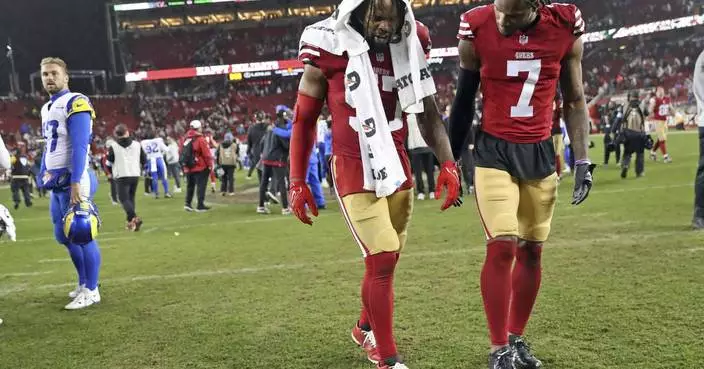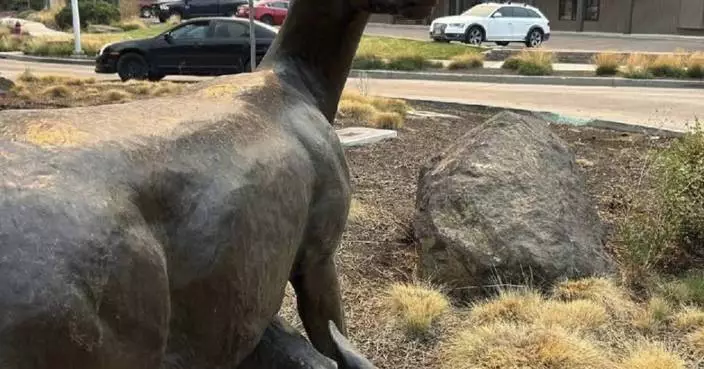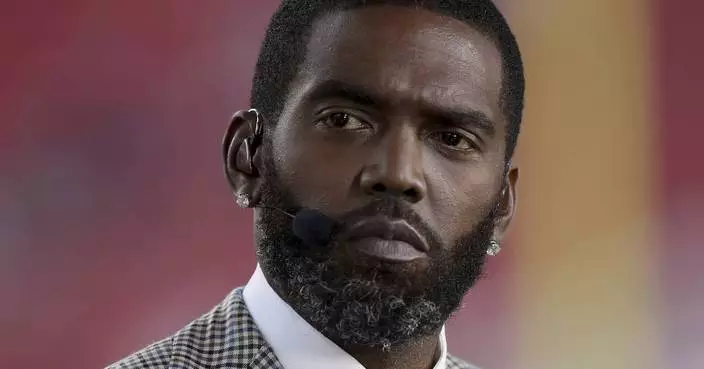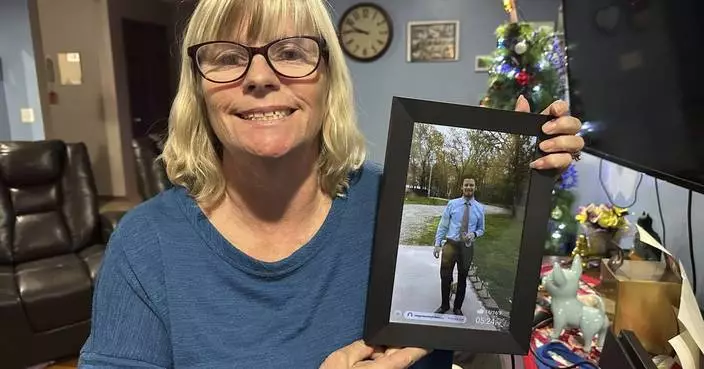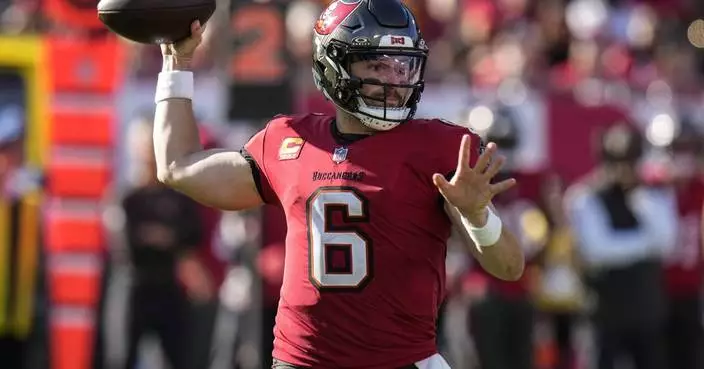LAS VEGAS (AP) — A federal jury in Nevada has awarded more than $34 million to a woman who was arrested at age 18, wrongly convicted twice, and served nearly 16 years in a Nevada state prison for a 2001 killing she did not commit.
Kristin Lobato, who is now 41 and uses the name Blaise, cried and hugged her attorneys after a judge read the trial verdict Thursday in U.S. District Court, the Las Vegas Review-Journal reported.
“It’s been an uphill battle with many, many obstacles,” she told reporters. “And I’m happy that it’s all finally finished.”
Lobato said she didn't know if becoming a millionaire would make up for years in prison, adding that she had “no idea what the rest of my life is going to look like.”
The civil trial jury found Las Vegas police and two detectives, now retired, fabricated evidence during their investigation and intentionally inflicted emotional distress upon Lobato. The panel determined that Lobato should receive $34 million in compensatory damages from the department and $10,000 in punitive damages from each former detective.
The detectives, Thomas Thowsen and James LaRochelle, and their attorney, Craig Anderson, declined to comment outside court. Anderson told U.S. District Judge Richard Boulware he planned to file additional court documents following the verdict. Anderson said Friday an appeal was “likely.”
The department previously agreed to pay damages if the jury ruled in Lobato’s favor.
Lobato was 18 when she was interviewed by police without an attorney, arrested and charged with killing Duran Bailey in Las Vegas in July 2001. Bailey, who had been homeless, was found dead near a trash bin with a slashed neck, cracked skull and missing genitals.
No physical evidence or witnesses connected Lobato to the killing, and she maintained she never met Bailey. But police maintained she confessed in jail that she had killed a man who tried to rape her during a three-day methamphetamine binge.
Lobato was 19 when she was convicted of murder in 2002. The Nevada Supreme Court threw out that verdict and Lobato’s prison sentence in 2004 because her lawyers weren’t able to cross-examine a prosecution witness who testified that Lobato made the jailhouse confession.
Lobato was tried again in 2006, convicted of manslaughter, mutilation and weapon charges, and sentenced to 13 to 45 years in prison.
She was exonerated and freed from prison in late 2017 after the Innocence Project and attorneys in Las Vegas again took her case to the state Supreme Court. Justices said evidence showed that Lobato was in her hometown of Panaca, Nevada, some 150 miles (214 kilometers) from Las Vegas when Bailey was killed.
Last October, a state court judge in Las Vegas issued a certificate declaring Lobato innocent of Bailey’s killing.
That action was challenged by Clark County Sheriff Kevin McMahill and Clark County District Attorney Steve Wolfson in a letter asking state Attorney General Aaron Ford to investigate how and why attorneys for Lobato acquired the certificate of innocence.

Kirstin Lobato shows off a tattoo as she walks out of the Lloyd George U.S. Courthouse in Las Vegas with her attorneys Elizabeth Wang and David Owens Thursday, Dec. 12, 2024. Lobato, who spent 15 years behind bars for the killing of a homeless man, was awarded $34 million in her lawsuit against the Metropolitan Police Department and two detectives who she claimed fabricated evidence against her. (K.M. Cannon/Las Vegas Review-Journal via AP)

Kirstin Lobato reacts outside of the Lloyd George U.S. Courthouse in Las Vegas with her attorneys Elizabeth Wang and David Owens Thursday, Dec. 12, 2024. Lobato, who spent 15 years behind bars for the killing of a homeless man, was awarded $34 million in her lawsuit against the Metropolitan Police Department and two retired detectives who she said fabricated evidence against her in a 2001 murder. (K.M. Cannon/Las Vegas Review-Journal via AP)
A 7-year-old rivalry between tech leaders Elon Musk and Sam Altman over who should run OpenAI and prevent an artificial intelligence "dictatorship" is now heading to a federal judge as Musk seeks to halt the ChatGPT maker's ongoing shift into a for-profit company.
Musk, an early OpenAI investor and board member, sued the artificial intelligence company earlier this year alleging it had betrayed its founding aims as a nonprofit research lab benefiting the public good rather than pursuing profits.
Musk has since escalated the dispute, adding new claims and asking for a court order that would stop OpenAI’s plans to convert itself into a for-profit business more fully.
The world's richest man, whose companies include Tesla, SpaceX and social media platform X, last year started his own rival AI company, xAI. Musk says it faces unfair competition from OpenAI and its close business partner Microsoft, which has supplied the huge computing resources needed to build AI systems such as ChatGPT.
“OpenAI and Microsoft together exploiting Musk’s donations so they can build a for-profit monopoly, one now specifically targeting xAI, is just too much,” says Musk's filing that alleges the companies are violating the terms of Musk’s foundational contributions to the charity.
OpenAI filed a response Friday opposing Musk’s requested order, saying it would “debilitate OpenAI’s business” and mission to the advantage of Musk and his own AI company and is based on “far-fetched” legal claims. A hearing is set for January before U.S. District Judge Yvonne Gonzalez Rogers in Oakland, California.
At the heart of the dispute is a 2017 internal power struggle at the fledgling startup that led to Altman becoming OpenAI's CEO.
Musk also sought to be CEO and in an email outlined a plan where he would “unequivocally have initial control of the company” but said that would be temporary. He grew frustrated after two other OpenAI co-founders said he would hold too much power as a major shareholder and chief executive if the startup succeeded in its goal to achieve better-than-human AI known as artificial general intelligence, or AGI. Musk has long voiced concerns about how advanced forms of AI could threaten humanity.
“The current structure provides you with a path where you end up with unilateral absolute control over the AGI," said a 2017 email to Musk from co-founders Ilya Sutskever and Greg Brockman. “You stated that you don't want to control the final AGI, but during this negotiation, you've shown to us that absolute control is extremely important to you.”
In the same email, titled “Honest Thoughts,” Sutskever and Brockman also voiced concerns about Altman's desire to be CEO and whether he was motivated by “political goals.” Altman eventually succeeded in becoming CEO, and has remained so except for a period last year when he was fired and then reinstated days later after the board that ousted him was replaced.
OpenAI published the messages Friday in a blog post meant to show its side of the story, particularly Musk's early support for the idea of making OpenAI a for-profit business so it could raise money for the hardware and computer power that AI needs.
It was Musk, through his wealth manager Jared Birchall, who first registered “Open Artificial Intelligence Technologies, Inc.,” a public benefit corporation, in September 2017. Then came the “Honest Thoughts” email that Musk described as the “final straw.”
“Either go do something on your own or continue with OpenAI as a nonprofit,” Musk wrote back. OpenAI said Musk later proposed merging the startup into Tesla before resigning as the co-chair of OpenAI's board in early 2018.
Musk didn't respond to emailed requests for comment sent to his companies Friday.
Asked about his frayed relationship with Musk at a New York Times conference last week, Altman said he felt “tremendously sad” but also characterized Musk’s legal fight as one about business competition.
“He’s a competitor and we’re doing well,” Altman said. He also said at the conference that he is “not that worried” about the Tesla CEO’s influence with President-elect Donald Trump. OpenAI said Friday that Altman plans to make a $1 million personal donation to Trump’s inauguration fund, joining a number of tech companies and executives who are working to improve their relationships with the incoming administration.
——————————
The Associated Press and OpenAI have a licensing and technology agreement allowing OpenAI access to part of the AP’s text archives.
This story has been updated to correct the name of the company registered in 2017. It was Open Artificial Intelligence Technologies, Inc., not Open Artificial Technologies Technologies, Inc.
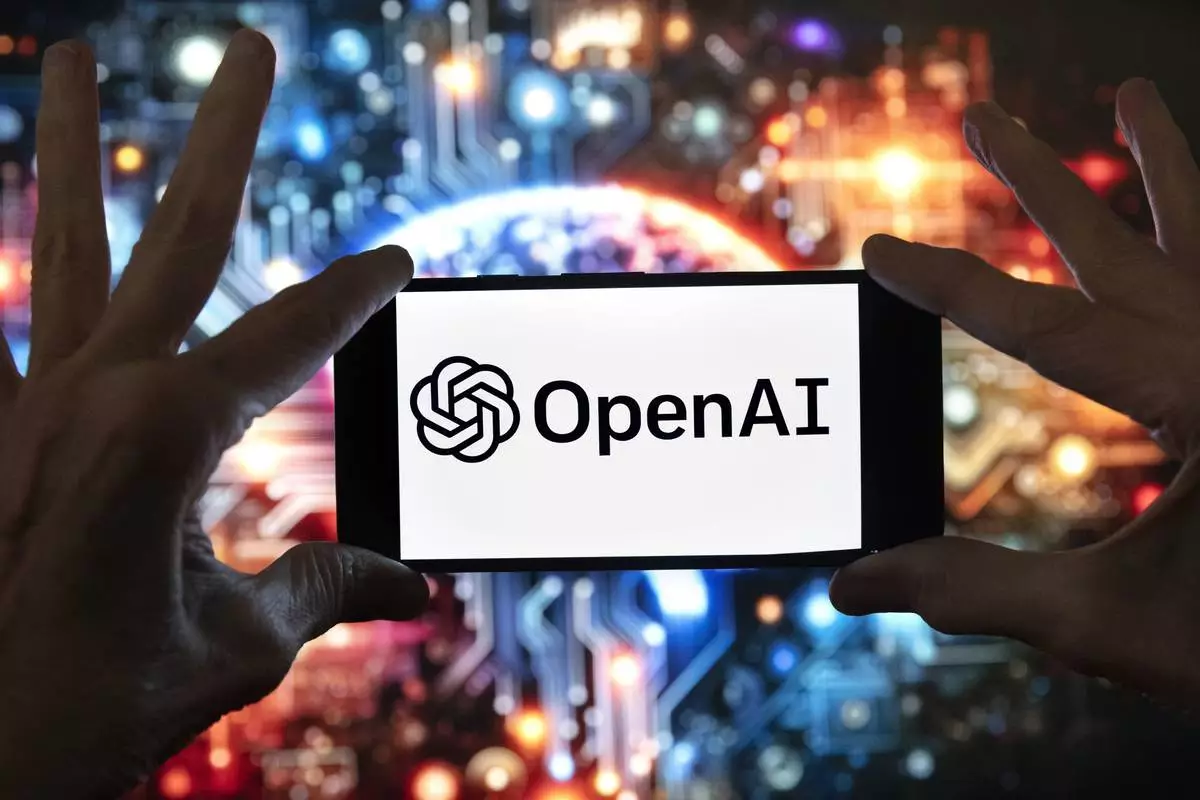
FILE - The OpenAI logo is displayed on a cell phone in front of an image generated by ChatGPT's Dall-E text-to-image model, Dec. 8, 2023, in Boston. (AP Photo/Michael Dwyer, File)








